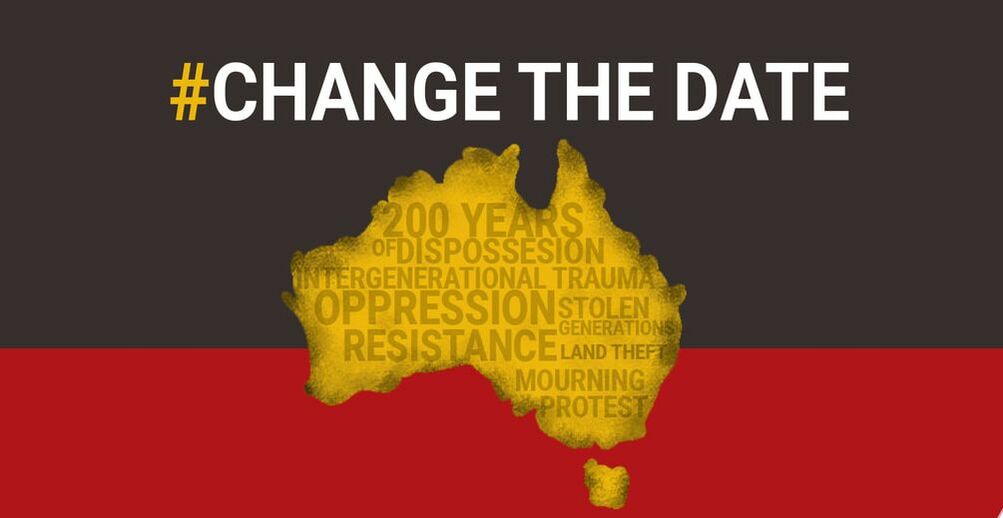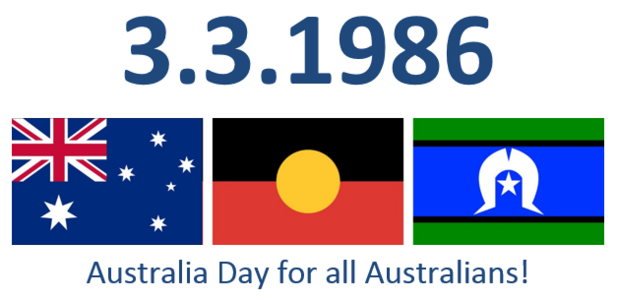I'm not going to pretend to know a lot about Australia's history. I learned very little in school on the subject, this film however, made me cry. Very powerful. From what I've read about it, I believe it to be historically accurate.
I'm uncomfortable knowing that a minority of fellow Australians, our First Nations people, are in distress each year as Anglo-Australians appear to endorse and celebrate their dispossession. While most Anglo-Australians may not think that their celebrations are directly targeting our thriving indigenous population, and are merely celebrating our national good fortune, it is demonstrably true that our koori cousins have not enjoyed a share of this fortune with the rest of us.
Change the date
Recent moves to promote changing the date of our national day are informed by the fact that many Australians - both Indigenous and non-Indigenous - feel they cannot celebrate on January 26, because that date marks the commencement of a long history of dispossession and trauma for Aboriginal and Torres Strait Islander people.
January 26 is the day that positions European settlement as the primary source of national identity and pride. In doing so, it ignores more than 76,000 years of pre-colonial history and 230 years of multicultural migration to Australia.
Australia Day was only formalised as a national holiday in 1994 – to some, that’s not a very longstanding tradition. While it has been celebrated in NSW as far back as 1818, we’ve only been celebrating it in an organised manner as a country for a couple of decades.
By comparison, Indigenous Australians have been protesting on the date since 1938 (the Anglo-Australian sesquicentennary). The Indigenous communities declared it a Day of Mourning that remains recognised to this day.
A new date
Signed by Queen Elizabeth II and PM Bob Hawke, the Australia Act was enacted simultaneously in Australia and the UK on 3 March 1986. This made Australia a sovereign, independent and federal nation. This was the first time Australia was declared independent. That's something all Australians can celebrate.
I'm not going to pretend to know a lot about Australia's history. I learned very little in school on the subject, this film however, made me cry. Very powerful. From what I've read about it, I believe it to be historically accurate.
March fourth for March Third!
I'm uncomfortable knowing that a minority of fellow Australians, our First Nations people, are in distress each year as Anglo-Australians appear to endorse and celebrate their dispossession. While most Anglo-Australians may not think that their celebrations are directly targeting our thriving indigenous population, and are merely celebrating our national good fortune, it is demonstrably true that our koori cousins have not enjoyed a share of this fortune with the rest of us.
Change the date
Recent moves to promote changing the date of our national day are informed by the fact that many Australians - both Indigenous and non-Indigenous - feel they cannot celebrate on January 26, because that date marks the commencement of a long history of dispossession and trauma for Aboriginal and Torres Strait Islander people.
• https://www.smh.com.au/national/nsw/struggle-and-survival-three-aboriginal-perspectives-on-australia-day-20200117-p53sgk.html
January 26 is the day that positions European settlement as the primary source of national identity and pride. In doing so, it ignores more than 76,000 years of pre-colonial history and 230 years of multicultural migration to Australia.

Australia Day was only formalised as a national holiday in 1994 – to some, that’s not a very longstanding tradition. While it has been celebrated in NSW as far back as 1818, we’ve only been celebrating it in an organised manner as a country for a couple of decades.
By comparison, Indigenous Australians have been protesting on the date since 1938 (the Anglo-Australian sesquicentennary). The Indigenous communities declared it a Day of Mourning that remains recognised to this day.
A new date
Signed by Queen Elizabeth II and PM Bob Hawke, the Australia Act was enacted simultaneously in Australia and the UK on 3 March 1986. This made Australia a sovereign, independent and federal nation. This was the first time Australia was declared independent. That's something all Australians can celebrate.
